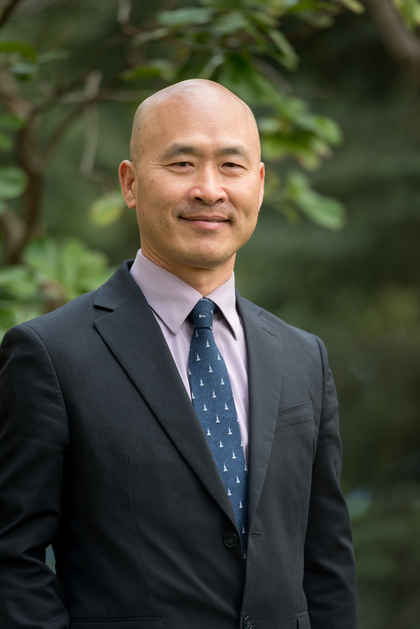[Korea Beyond Korea] Buddhism scholar committed to expanding Korean studies at Yale
By Kim So-hyunPublished : Nov. 13, 2023 - 14:00

HERALD INTERVIEW
Yale University was the only Ivy League school that didn’t have a Korean studies faculty member, other than Korean language lecturers, until 2018, when it hired Kim Hwan-soo as a professor of religious studies.
Kim, a Buddhist monk and professor of Korean Buddhism and culture, received his doctorate in the colonial history of Korean and Japanese Buddhism from Harvard University and previously taught at Duke University.
“Students at Yale had called for a Korean studies program since the 1990s. Professors of Chinese and Japanese studies also insisted that East Asian studies without a Korean studies program was meaningless,” Kim, who is now associate professor of religious studies and chair of the Council on East Asian Studies at Yale University, said in an interview with The Korea Herald.
In the past five years, Yale has appointed three more Korean studies professors -- specializing in modern Japanese and Korean history; Asian Christianity and theology; and modern Korean literature and popular culture. In comparison, the university has 18 Chinese studies and 12 Japanese studies professors.
Harvard University has six professors of Korean studies, over 40 years after it set up its Korea Institute to support and develop Korean studies there.
Yale could increase its Korean studies faculty in a relatively short period of time, as it recognized the importance of Korea, with university President Peter Salovey visiting Korea in March this year to meet alumni and students' parents. Among the foreign students at Yale, Koreans are the fifth-largest group after Chinese, Canadian, Indian and British students.
Unlike Harvard University, which has separate institutes for Korean, Japanese and Chinese studies, Yale has all three under the Council on East Asian Studies, which Kim has chaired since 2021.
“Korean studies at Yale could grow thus far thanks to its professors of Chinese and Japanese studies. As scholars, they needed Korean studies for the overall development of East Asian studies at Yale. Professors of Japanese studies were highly proactive,” Kim said.
While having freestanding institutes would mean more autonomy and management of endowments within each discipline, the strength of the CEAS is that the three share everything.
“We share all the events, which means a Chinese studies faculty member would know what events are scheduled or ongoing in Japanese studies. For budget allocation, we look into all three programs,” he said.
Kim hopes that the next Korean studies faculty member to join Yale could be someone specializing in ancient or premodern Korea, as the field severely lacks scholarship in the US.
In February this year, the CEAS invited Youn Myung-chul, a professor of archaeology at Samarkand State University of Uzbekistan, to give a special lecture on the ancient cultural exchange between Korea and Eurasia, and have a conversation on Korean history with Odd Arne Westad, a professor of history at Yale.
Kim is also committed to building the university's Korean studies program by rallying support from corporations in Korea among others.
Whereas Japanese or Chinese studies programs at Yale receive substantial support from Japanese and Chinese companies, Korean studies has had difficulties in terms of corporate sponsorship and specialized educational resources.
Like many US universities, Yale has endowed professors, whose salaries are paid with the interest earned from millions of dollars in donated funds.
A donation of around 100 million won (now equivalent to $75,747) made in the 1970s by a Japanese entity, for instance, was invested by the university to grow into some 10 billion won over 50 years, which would bear annual interest worth hundreds of millions of won, Kim explained.
The Japan Foundation created hundreds of professorships this way over 50 years at overseas universities. The Korea Foundation, established in 1991, has set up over 150 professorships in 18 countries.
“We’re catching up fast,” Kim said, adding that several Korean chaebol have made financial contributions to Korean studies at Yale in recent years.
“There has never been a time in Korean history where the country has been so affluent. Cultural products are important, but we also need to utilize this momentum to foster scholars of Korean studies outside Korea,” he said.
"Korean Studies Beyond Korea” explores the current landscape of Korean studies through interviews, in-depth analyses and on-the-ground stories told from diverse world areas. Funded by the Korea Press Foundation, this series delves into the challenges and opportunities facing the field as Korea's rise as a cultural powerhouse has drawn interest from scholars, researchers and leaders from around the globe. – Ed.











![[Hello India] Hyundai Motor vows to boost 'clean mobility' in India](http://res.heraldm.com/phpwas/restmb_idxmake.php?idx=644&simg=/content/image/2024/04/25/20240425050672_0.jpg&u=)








